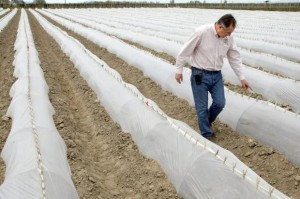
Alan Schreiber walks through rows of organic cantaloupe on his farm in franklin County, WA, he’s applied to grow marijuana but is concerned about federal water resources. Photo Bob Brawdy MCT
With no federal water, pot growers could be high and dry
BY ROB HOTAKAINEN
McClatchy Washington Bureau April 27, 2014
Alan Schreiber walks through rows of organic canteloupe on his farm in Franklin County, Washington. Schreiber has applied to grow marijuna in Washington but is concered about federal water resources.
BOB BRAWDY — MCT
WASHINGTON — Newly licensed marijuana growers in Washington state may find themselves without a key source of water just as spring planting gets under way.
Federal officials say they’ll decide quickly whether the U.S. government can provide water for the growers or whether doing so would violate the federal Controlled Substances Act, which makes possession of the drug illegal.
The U.S. Bureau of Reclamation, which controls the water supply for two-thirds of Washington state’s irrigated land, is expected to make a decision by early May, and perhaps as soon as this week, said Dan DuBray, the agency’s chief spokesman.
The ruling will mark another key test for the Obama administration, which again will decide how far it will go in allowing the state to bypass federal law with its experimental plan to license growers and sell pot for recreational use.
The government’s decision also will affect growers in Colorado _ the only other state to fully legalize marijuana _ but would likely have limited impact there because Colorado allows only indoor pot farms.
While the administration so far has done nothing to block either state, some local officials predict the Bureau of Reclamation is sure to rule that the water cannot be used on marijuana plants, since the drug has been banned by Congress.
“I’m almost certain that’s what they’re going to tell us,” said Scott Revell, district manager for the Roza Irrigation District in Washington state, which contracts with the federal agency to provide water to roughly 72,000 acres in the Yakima Valley.
Such a decision would mark a clear victory for legalization opponents, but they say it should not be unexpected.
“I don’t think we should be too surprised that people who are breaking federal law cannot access federally controlled water,” said Kevin Sabet, a former drug policy adviser for President Barack Obama who’s now the director of the anti-legalization group Project SAM (Smart Approaches to Marijuana). “This is the kind of thing that happens when sloppy state laws pass and you try to fit a square peg in a round hole.”
Washington state officials already are discussing other ways that growers could get their water.
While most of the growing operations are expected to be fairly small _ the largest will be only two-thirds the size of a football field _ growers may be able to drill their own wells or tap into a city water supply, said Joye Redfield-Wilder, spokeswoman for the Washington state Department of Ecology. Under state law, greenhouse growers can use well water if their operations use no more than 5,000 gallons of water per day, she said.
“It may or may not be a problem at all,” Redfield-Wilder said. “I think we’re just kind of in a gray area. I think the federal government is a little bit in that gray area, too.”
With marijuana being so valuable, licensed growers won’t be deterred by the federal government, said Alan Schreiber, a Franklin County farmer who has applied for a license to grow marijuana for pest-control research.
“This is an annoyance and a nuisance but I can assure you _ I can assure you _ they will find water for this,” Schreiber said. “Water, relatively speaking, is not that expensive. You can get it from a well. You can find somebody. There’s wells everywhere around here.”
Schreiber said he relies on federal water for his operation, which has included asparagus, peaches, grapes and raspberries.
“I have a lot of crops. Are they going to come on my farm and monitor my water use?” Schreiber asked.
Revell said his water district has not yet figured out how to deal with farmers growing multiple crops.
“These kinds of details have not been fleshed out,” he said.
The Bureau of Reclamation is a key federal agency in the West, best known for the dams, canals and power plants it has built in 17 states. Created in 1902 to promote economic development, it’s now part of the Department of Interior and delivers water to more than 31 million people and one out of every five Western farmers. It contracts with local irrigation districts to provide the water.
DuBray said the bureau is working with the Justice Department on its legal analysis, which he said was prompted by requests from local officials in both Washington state and Colorado. Voters in both states decided to legalize marijuana for recreational use in November 2012.
“We’re having a lot of discussions about this issue,” DuBray said.
With Washington state moving slowly to implement its plan, the issue has aroused little opposition among growers. As of Tuesday, only 18 growers had been licensed by the state. But the potential disruption could be huge, after the state received more than 2,700 applications in November and December.
The issue also has stirred little interest on Capitol Hill, with most members of the Washington state delegation saying they’ve not taken a position or are not involved. Spokesmen for both of the state’s Democratic senators, Patty Murray and Maria Cantwell, had no comment.
One exception: Democratic Rep. Adam Smith defended the growers and renewed his call for Congress to pass a law that would force the federal government to abide by the wishes of state voters in setting marijuana policy.
“The only way to ensure that state law as it pertains to marijuana is recognized is by passing the Respect for State Marijuana Laws Act,” said Smith, one of 26 House members who’s co-sponsoring the bill authored by Republican Rep. Dana Rohrabacher of California.
For now, legalization advocates are counting on the Obama administration to help them out again.
In August, the Justice Department said it would allow both Washington state and Colorado to tax and sell pot as long as they did a good job policing themselves.
And in February, the Justice Department said it would advise U.S. attorneys in states where the sale of marijuana is legal not to prosecute banks that allow pot stores to open accounts and accept credit card payments. Federal law prohibits banks from accepting any money linked to pot transactions.
Alison Holcomb, criminal justice director of the American Civil Liberties Union of Washington in Seattle, said the Justice Department already has recognized that “a well-regulated domestic marijuana market” could displace criminal groups that are currently damaging land and diverting water for illegally grown marijuana in national parks and forests.
“But this won’t happen if the bureau denies (state) licensees legal access to the resources their illegal competitors are already stealing,” said Holcomb, the lead architect of Initiative 502, the ballot measure approved by voters to legalize marijuana.
Derek Franklin of Issaquah, the Washington state coordinator of Project SAM, called the dispute “another symptom of a very problematic law” that again shows the conflict between state and federal statutes.
“Ultimately, if the water-rights issue becomes another that is bent to allow for the implementation of this disastrous law, then law enforcement gets another demoralizing headache (and) Washington teens see another example of adults breaking their own rules,” he said.
It’s uncertain exactly how many growers could be affected.
The Bureau of Reclamation, the nation’s largest wholesaler of water, provides irrigated water to roughly 1.2 million acres of land in Washington state, said Peter Soeth, a spokesman for the bureau’s Denver office. He said that’s two-thirds of the total, based on a Washington State University report that found the state has a total of 1.8 million acres of irrigated land. Much of the federally controlled water comes from the Columbia and Yakima rivers, providing water for the state’s prime farmland.
Revell wrote a letter to Benton and Yakima county commissioners earlier this month, warning them of a potential loss of water. He said growers deserve to know what might happen as soon as possible.
“People from other places are trying to buy farms and properties and they’re investing hundreds of thousands of dollars,” he said. “And it’s quite possible that they will not be able to get at least federally sourced irrigation water.”
JORDAN SCHRADER OF THE NEWS TRIBUNE IN TACOMA, WASH., CONTRIBUTED TO THIS REPORT.
Email: rhotakainen@mcclatchydc.com; Twitter: @HotakainenRob.
Read more here: http://www.mcclatchydc.com/2014/04/27/225633/with-no-federal-water-pot-growers.html?sp=/99/100/&ihp=1#storylink=cpy









